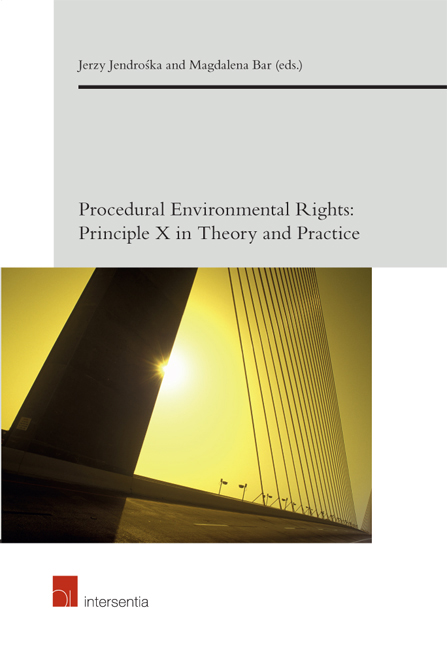Book contents
- Frontmatter
- Contents
- Introduction Procedural Environmental Rights in Theory and Practice
- Procedural Environmental Rights: Status and Developments
- Developing Standards for Procedural Environmental Rights through Practice – The Changing Character of Rio Principle 10
- The Evolution of Participatory Rights in the Era of Fiscal Austerity and Reduced Administrative Burden
- Definitions of the Aarhus Convention v the Proposal for a New Latin America and the Caribbean Instrument – Mapping the Differences in the Material Scope of Procedural Environmental Rights in International Law
- Procedural Environmental Rights in Practice
- Public Participation
- Access to Justice
- Procedural Environmental Rights and Nature Protection
- Procedural Environmental Rights and EIA
- Procedural Environmental Rights and Climate Change
Developing Standards for Procedural Environmental Rights through Practice – The Changing Character of Rio Principle 10
from Procedural Environmental Rights: Status and Developments
Published online by Cambridge University Press: 12 October 2018
- Frontmatter
- Contents
- Introduction Procedural Environmental Rights in Theory and Practice
- Procedural Environmental Rights: Status and Developments
- Developing Standards for Procedural Environmental Rights through Practice – The Changing Character of Rio Principle 10
- The Evolution of Participatory Rights in the Era of Fiscal Austerity and Reduced Administrative Burden
- Definitions of the Aarhus Convention v the Proposal for a New Latin America and the Caribbean Instrument – Mapping the Differences in the Material Scope of Procedural Environmental Rights in International Law
- Procedural Environmental Rights in Practice
- Public Participation
- Access to Justice
- Procedural Environmental Rights and Nature Protection
- Procedural Environmental Rights and EIA
- Procedural Environmental Rights and Climate Change
Summary
PRINCIPLE 10 AND THE COMPLEXITY OF SUSTAINABILITY TRANSITION
THE STANDARD NOTION OF PRINCIPLE 10'S INDISPENSABILITY TO SUSTAINABILITY
In 1992, advanced Western democracies celebrated the adoption of the Rio Declaration and Agenda 21 as a blueprint for a more sustainable world. One of the 27 principles in the Declaration recognized the implementation challenges arising from the fundamental restructuring of the global economy and the need to engage and mobilize the global population. Rio Principle 10 had its roots in the following statement in Our Common Future (The Brundtland Report):
“The law alone cannot enforce the common interest. It principally needs community knowledge and support, which entails greater public participation in the decisions that affect the environment.”
This notion of the common interest, which requires community knowledge and support to be realized, extends even further into the past, to Principle 1 of the Stockholm Declaration of the UN Conference on the Human Environment (1972), the clearest statement in any global legal or political instrument on the fundamental relationship between humans and their environment. Public participation is indispensable to the sentiment in Stockholm Principle 1 that “[humankind] bears a solemn responsibility to protect and improve the environment for present and future generations.” Rio Principle 10 is an expression of the operative principle that through the exercise of civil, political and procedural rights individuals and associations can influence civic space in order to promote policymaking and decision-making that will protect and improve the environment and ensure sustainability.
Application of Principle 10 goes hand-in-hand with the increasing realization of the potential for global harm arising from pollution in its various forms. International law has responded through the progressive development of concepts related to the principle of harm prevention, as elaborated in cases such as the Gabcikovo-Nagymaros Case (Hungary v. Slovakia) and the Pulp Mills on the River Uruguay case (Argentina v. Uruguay), which present a logical framework that can lead towards the gradual acceptance of public participation in environmental decision-making as a necessary component of the international community's due diligence in preventing harm to the global commons.
- Type
- Chapter
- Information
- Procedural Environmental RightsPrinciple X in Theory and Practice, pp. 3 - 18Publisher: IntersentiaPrint publication year: 2018



